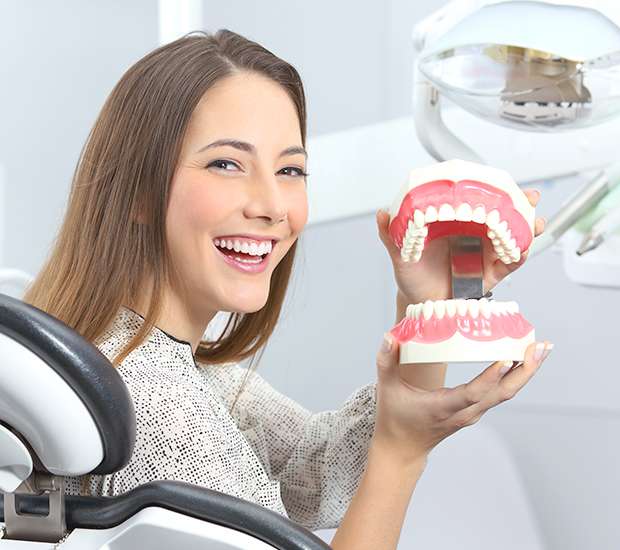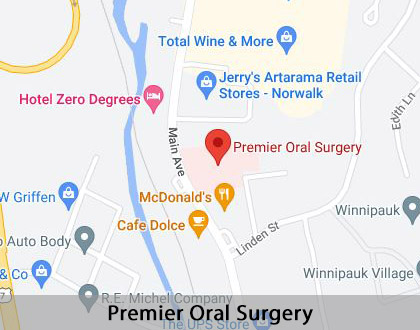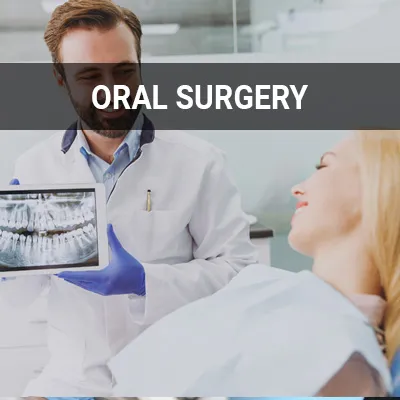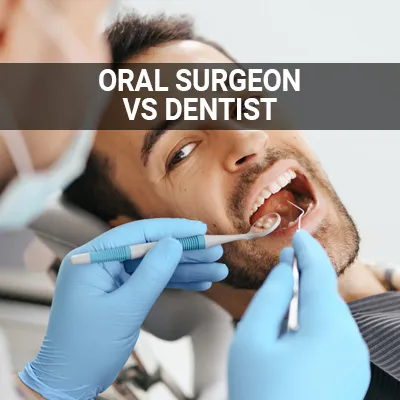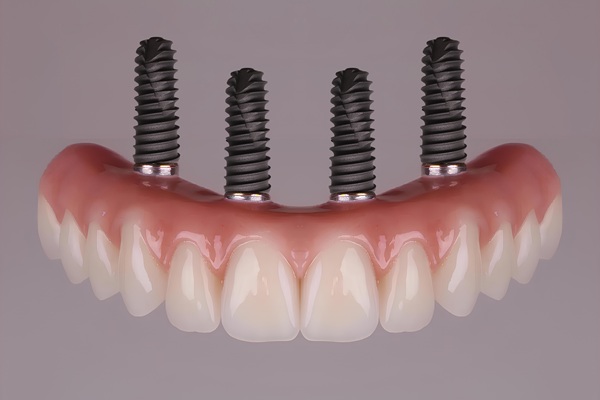Implant Dentist Norwalk, CT
An implant dentist can place the implant and design the dentures that attach to it. Dental implants are an effective treatment for people with missing teeth, providing a stable and durable solution that mirrors the function and appearance of natural teeth. Our oral surgeon provides dental implants to help restore a smile, the function of teeth, promote oral health, and more.
Our oral surgeon provides dental implants and more at Premier Oral Surgery to patients in Norwalk and the surrounding area. Those considering implants can learn more about the procedure by speaking with our team. Call our office at (203) 945-0049 to schedule a consultation
Implant Dentists Have Special Training
Although some general dentists can place dental implants, many will refer patients to an oral surgeon with extensive experience in performing dental implant procedures. "Implant dentistry" is not a recognized dental specialty. However, there are recognized dental specialties that place a stronger emphasis on implant dentistry procedures, such as maxillofacial or oral surgeons, periodontists, and prosthodontists. Specialists in these areas are likely to have additional and more specialized experience in dental implant procedures.
Unlike general dentists, they have to complete additional three years of education and training in their specialty in order to practice. After that, some decide to become board certified. This requires they pass a rigorous exam to prove mastery of basic knowledge in their specialty. Once certified, they have to recertify every few years to make sure they are current in their field. If a patient comes to their general dentist needing an extensive or complex dental implant procedure, that general dentist will likely refer them to one of these specialists who are more equipped to help them.
“Unlike general dentists, they have to complete additional three years of education and training in their specialty in order to practice.”
What Patients Can Expect During the Implant Process
There are several steps to an implant procedure. It begins with an initial consultation and exam. The practitioner may take impressions, 3D images, or X-rays and then create a treatment plan following these steps, as outlined by the the American Academy of Implant Dentistry:
- Implant placement. The dentist makes an incision in the gums and places the implant, a metal post, into the jawbone. Patients may have minor discomfort in the form of swelling after this procedure. This can usually be managed with over-the-counter medicine.
- Osseointegration. During the healing process, the patient’s jawbone grows together with the post. This process can take several weeks but should not interfere with the patient’s daily routine. Soft food for the first few weeks may be suggested.
- Placing abutments. When the implant has bonded with bone tissue, we will then attach an abutment. This small connector anchors dentures to the implant. It is placed just above the gumline.
- Making dentures. Once the gums heal, the dentist takes impressions of the patient’s mouth. These create customized artificial teeth. The dentist then attaches these teeth to the abutment.
- Follow-up appointments. Depending on its complexity, the implant process may take several weeks to months. Once complete, the dentist needs to check the fit and wear of the teeth. Patients should continue to receive regular dental checkups to ensure the implant is in good shape.
“Depending on its complexity, the implant process may take several weeks to months.”
The Difference Between Dentures and Implants
The American Dental Association describes dentures as removable appliances. They are artificial teeth mounted on synthetic gum tissue and fit over the patient’s existing gums. Dentures may be a full arch of upper or lower teeth, a partial denture, or a bridge. Complete dentures require adhesive to remain in place, while bridges may connect to neighboring teeth.
Implants are metal posts placed into the jaw bone. This titanium post provides a solid anchor for artificial teeth that will not move around in the mouth. They work similarly to the roots of regular teeth, allowing patients to eat, drink, and talk as if they had natural teeth. Also, this titanium post stimulates the jawbone preserving its density just as a natural tooth root would do.
“They work similarly to the roots of regular teeth, allowing patients to eat, drink, and talk as if they had natural teeth.”
Check out what others are saying about our dental services on Yelp: Implant Dentist in Norwalk, CT
Types of Dental Implants and Their Benefits
There are many benefits to choosing implants. WebMD lists improved appearance and speech, as well as increased comfort and more natural eating among them. Preservation of bone tissue is another benefit and one that other options cannot provide.
In addition to these benefits, dental implants are a versatile tooth replacement option. Here are some of the main ways dental implants can be used to replace teeth:
- Mini implants. Mini implants offer the same stability in about half the size. They are designed to have two parts, including a post with a ball on top that connects to the top half, which features a socket on its bottom end. The top piece then attaches to artificial teeth with a rubber O-ring.
- Implant-supported bridges and dentures. Those who are missing several teeth can choose implant-supported partial dentures or bridges. Typically, a single implant can support multiple teeth. The bridge does not need support from adjoining teeth, and dentures do not need adhesive.
- Implants for complete dentures. Implants can also support a full set of dentures. Two implants are usually needed on both the top and bottom arches—four in total.
- Single tooth implants. For patients with a single tooth missing, a dental implant is usually the preferred choice. A patient can bite and chew normally with this stand-alone implant.
“WebMD lists improved appearance and speech, as well as increased comfort and more natural eating among them.”
Questions Answered on This Page
Q. Why would a dentist refer a patient to a specialist for dental implant surgery?
Q. What are the steps to the dental implant procedure?
Q. What is the difference between dentures and dental implants?
Q. What are the benefits of dental implants?
Q. What makes someone a good candidate for dental implants?
People Also Ask
Q. Why do patients need oral surgery?
Q. How is an oral surgeon different from a general dentist?
Q. How should patients prepare for surgery?
Q. What types of dental sedation are available in a dental office?
Q. What happens during the dental implant procedure?
Who is a Good Candidate for a Dental Implant Procedure
Most people who want to replace one or more teeth can become good candidates for dental implant surgery. First, a patient must have an adequate jawbone to support dental implants. However, patients who are weak in this area can undergo dental bone grafting or even consider mini implants. Second, a good candidate has good oral and physical health. Third, a patient must be willing to commit to a long process that may take from 6 months to a year, longer if dental bone grafting is needed.
It is also important that the patient is committed to taking care of their mouth after the procedure. Patients must understand they will still need regular dental appointments and to brush and floss daily. It is also important to remain a non-smoker and keep an oral health-friendly diet. Along with ending bad habits such as chewing on pens or grinding one’s teeth, these changes will keep the mouth healthy and extend the life of one’s dental implant-supported crowns or restorations.
“Patients must understand they will still need regular dental appointments and to brush and floss daily.”
Frequently Asked Questions
Q. How long do dental implants last?
A. With proper care, implants can last from several years to a lifetime. That includes regular care and checkups with a dental professional. However, though the implant post can last a lifetime, the crowns must usually be replaced every 10-15 years. Again, the life of the crowns can be extended with proper care.
Q. Can everyone get implants?
A. Anyone with general good health may be a candidate. Smokers and those with diabetes or heart disease may not. We can discuss the possibilities with you and what you may be able to do to make yourself a good candidate.
Q. Is getting a dental implant comfortable?
A. Patients may feel some discomfort while an oral surgeon places the posts. Many find the experience similar to having a tooth pulled. Mild tenderness afterward can be easily managed. Wet can discuss with you what to expect for your particular procedure.
Q. How should I care for dental implants?
A. Although the teeth may be artificial, your gums are not. Even patients with a complete set of implants need to brush and floss daily. You will also still want to see a dentist once every six months. This care can help prevent a form of gum disease called peri-implantitis that affects those with dental implants.
Q. Why should I see an implant dentist?
A. An implant dentist has additional training and experience. Your general dentist may refer you. You can also see an implant dentist without a referral.
Start Feeling Better – Visit Us Today
By visiting us as soon as possible, our team can help get you the professional treatment you need. Instead of waiting around and allowing the symptoms to get worse, we can provide you with treatment options.
Schedule a Consultation
Our oral surgeon offers patients the opportunity to enjoy looking and feeling normal again. To learn more about the options available, patients should ask for a consultation with our team. Contact Premier Oral Surgery in Norwalk by calling 203-945-0049 .
Helpful Related Links
- American Dental Association (ADA). Glossary of Dental Clinical Terms. 2023
- American Academy of Cosmetic Dentistry® (AACD). Home Page. 2023
- American Academy of Maxillofacial Prosthetics. American Academy of Maxillofacial Prosthetics. 2023
- American Association of Oral and Maxillofacial Surgeons. American Association of Oral and Maxillofacial Surgeons. 2023
- American College of Oral and Maxillofacial Surgery. American College of Oral and Maxillofacial Surgery. 2023
- National Cancer Institute (NCI). National Cancer Institute (NCI). 2023
- WebMD. WebMD’s Oral Care Guide. 2023
About our business and website security
- Premier Oral Surgery was established in 2017.
- We accept the following payment methods: American Express, Cash, Discover, MasterCard, and Visa
- We serve patients from the following counties: Fairfield County
- We serve patients from the following cities: Norwalk, Cranbury, Spring Hill, New Canaan, Westport, West Norwalk, East Norwalk, South Norwalk, Wilton, Westport, Weston, New Canaan, Tokeneke, Rowayton, Darien, and Noroton
- Norton Safe Web. View Details
- Trend Micro Site Safety Center. View Details
Back to top of Implant Dentist
